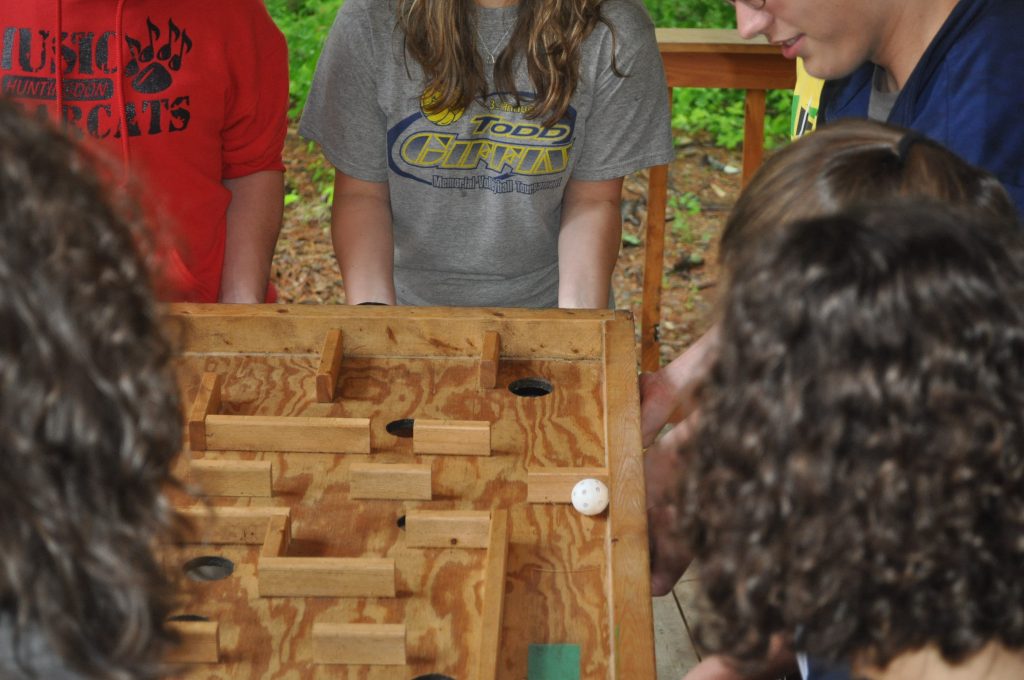Over the years, Shaver’s Creek has found that experiential activities can often enhance and complement trainings that are more traditional in nature. Depending on the number of participants in your group/team, activities may be facilitated in large or small group settings.
Note: Program design may vary depending on your desired outcomes of the experience. The sample agendas below give you an overview of some possible activities.
More programming options? Follow-up programming will help your team embed development concepts into the culture of your organization. We know there is value and lasting effects when we revisit our programming conversations in a meaningful way.
Half-Day Program
While a half day is not a lot of time to explore group process or team challenges, the following objectives can be met in this time frame:
- Help participants get to know one another quickly and differently than they might in the workplace, helping to strengthen interpersonal relationships and productivity.
- Establish a sense of team camaraderie and greater awareness of the importance of teamwork.
- Create an atmosphere of mutual support in which cooperation and encouragement are emphasized.
| Time | Event |
|---|---|
|
8:30 a.m. |
Introduction and Overview |
|
8:35 a.m. |
Connection Activities It is our philosophy that a foundation of connection is paramount to teamwork. At the beginning of our programming, we spend time fostering interpersonal relationships between team members through conversation activities and playful interactions. |
|
9:30 a.m. |
Skills-Based Activities Once a group/team experiences some deeper connection time, we will break out in smaller groups (depending on overall numbers) to explore elements of teamwork through experiential activities. |
|
10:30 a.m. |
Break |
|
10:45 a.m. |
Problem-Solving Activities Dive deeper into leadership/behavioral styles through activities that challenge participants to observe how they contribute to team outcomes. |
|
Noon |
Large Group Reflections — Takeaways and Learnings |
|
12:30 p.m. |
Depart |
Full-Day Program
A daylong program would reinforce the objectives that can be achieved in a half-day program and additionally serve to:
- Help participants to assess critical factors in team tasks and more deeply explore how teams can effectively capitalize on group resources.
- Help participants further develop clear and effective leadership skills to help in their personal development.
| Time | Event |
|---|---|
|
8:30 a.m. |
Introduction and Overview |
|
8:35 a.m. |
Connection Activities It is our philosophy that a foundation of connection is paramount to teamwork. At the beginning of our programming, we spend time fostering interpersonal relationships between team members through conversation activities and playful interactions. |
|
9:30 a.m. |
Skills-Based Activities After our warm-up connection session, we will break out in smaller groups (depending on overall numbers) to explore elements of teamwork through experiential activities. |
|
10:30 a.m. |
Break |
|
10:45 a.m. |
Behavioral/Leadership Styles We spend some time in interactive conversation exploring various behavioral/leadership models and their impact on group work. |
|
Noon |
Lunch and Self-Guided Tours of Our Facilities
|
|
1:00 p.m. |
Problem-Solving Activities Dive deeper into leadership/behavioral styles through activities that challenge participants to examine how they show up in group processes and their contributions to outcomes. |
|
2:30 p.m.
|
Break |
|
2:45 p.m. |
Activity Swap Give participants an opportunity to share knowledge they learned to help other members of their collective team succeed. |
|
3:30 p.m. |
Large Group Reflections — Takeaways and Learnings |
|
4:00 p.m. |
Depart |

